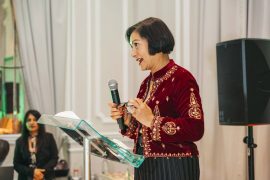Felicia Twumasi, CEO, Homefoods Limited, a leading Ghanaian entrepreneur, shares with Amazons Watch Magazine, in an exclusive interview, her inspiring entrepreneurship journey- from a big dream at a tabletop in a kitchen in 1995 to a high-scale ethnic food processing and packaging company, with a distribution network across The United Kingdom, Italy, Switzerland, North America and West Africa, and export sales increasing into multi-million dollars per annum. However, it is interesting to note that this successful businesswoman faced quite a number of challenges along this journey, other than racial and gender discrimination. Excerpt:
Please tell us about your experience growing up as a girl in Ghana.
Growing up in a convent in Elmina, a small town in the Central Region of Ghana I witnessed nightmare moments of gloom where many of my friends had to close the chapter of schooling just because they lost their fathers; family breadwinners. This ignited the fire of enterprise in me, forming the foundation upon which today’s superstructures stand. This same flame has stayed alive not only to keep family and I financially independent through education, but also to empower fellow women to do same, in order to minimise if not avoid entirely a replay of my childhood experience.
I was privileged to be close to my grandma when growing up, thus picking up her dexterity in cooking and now, as it were, my love for cooking. Skills she picked up from exposure to other parts of Ghana and abroad combined with recipes from her travels with her parents; today I share with the world and in itself, keeps my flame burning.
It is quite intriguing that you conceived the idea of Homefoods in 1995 at your kitchen table. Kindly share with us your entrepreneurship journey.
Having this childhood experience imprinted in my memory when I was growing up and seeing women on trucks with their agro- produce coming to the main markets, ignited that urge to start this journey. I knew immediately that I had to do something for these women.
There I planned the vision and mission toward these women to process the perishable agro-produce into products. With the vision and mission set, the journey started.
My vision has been to create, build and establish a quality food chain industry by fusing flavours and spices from around the world, to meet my consumer needs while my mission is to focus attention and creativity on basic food ingredients and services to all and sundry, homes, catering, hotels and fast food industries, food products they absolutely need and want, thus making every meal an experience. This I sought to obtain through adaptive production, inventory management and product design while creating value and wealth for our nation through agriculture in order to maintain a sustainable legacy for posterity.
Homefoods is a 100% Ghanaian owned company within the FMCG marketing industry which is dominated by multinationals. It was thus birthed some 22 years ago from a dream I envisioned and, indeed, what a big dream that was from a tabletop in my kitchen way back then, that dream was to grow an Agro-based business to engage in the processing and packaging of various ethnic foods, specifically for the export market. From the top of that Kitchen table, I started bottling edible Palm Oil for export to the United Kingdom with just two workers; one staff and my daughter and 5 women suppliers. Why Palm oil? It took one inspiring idea of exporting a product that was non-perishable but essential to cooking. Palm oil fit the bill, with its rich red oil processed from fruits of the palm.
Now, we are a high-scale ethnic food processing and packaging company in Ghana with a current distribution network including; The United Kingdom, Italy, Switzerland, North America, The Gambia and Equatorial Guinea and our own sub-region, West Africa.
Homefoods has been able to keep up its business-level strategy through sustainable competitive advantage in discrete yet identifiable markets of export for all these years. We have Kept 70% market share in the Red Oil business for 14 years and counting on our customised brands such as BLUE BAY, TROPIGOLD, AFRICA’S FINEST, GHANA BEST, YADCO, BIG MAMA, HOMEFOODS AND HOMESENSE.
We are, however, now looking into West, East and Southern African markets. Our exports have grown exponentially from 100 boxes per order in 1995 to a full container per month to forty FCL per year and still growing, with our export sales increasing into multi-million dollars per annum.
In 2009, we embarked on a new business model by adding value to the palm oil and vegetable oil thus expanding to other food product lines such as Vegetable Oil, Various seasoning, Ready to Eat Meals and Soup of West African Taste made for the world and soon, snacks and Laundry, Carbolic and Liquide Soaps made from Palm Oil derivatives. They have been made to suit both international and local consumer demands; all packaged under international standards in attractive stand-up pouches in addition to our Pioneer products being Palm oil and Grains. This growth has been as a result of extensive research and multimarket activities based on our agro-business and thus resulting in our expansion into four factories since outgrown our Head Quarters in Accra:
- Palm Oil and Vegetable Oil Packaging Factory– Odorkor, Accra.
- Ready-To-Eat Factory– Rented space at Food Research Institute, Accra.
- Grains and Legume Snacks & Seasoning Packaging Factory– Agility Industrial Park, Kpone, Tema.
- Derivatives of Palm-Soap Factory (Liquid, Laundry and Detergent Soaps)- Oleo Chemical Plant, Boadi, Kumasi.
Our future plans comprise relocating into our modern facility so as to incorporate all these sites. My dream of building an Agro-Food Processing Empire, we have termed “THE HOMEFOODS CORRIDOR FOOD VILLAGE” a 15-year intellectual odyssey by me. A diversified business entity which will enable all initiatives to converge, eliminating all divergences therefore backed by resources and professionals who will formulate and implement activities and businesses that lie within the corporate hierarchy. This will thus expatiate the role each expert is to play to enable us all, from the farmer to the good infrastructure to the logistic companies to the security institutions etc. to mention a few, to all come and converge on this corridor thereby enhancing food security and the health of the nation, ensuring to leave a sustainable legacy to posterity.
I believe our Agro business is sustainable based on reliable and transparent value chain, fair prices and our concern for environmental, social and cultural values which causes us to be linked to improving Nutrition, Health, Agriculture and productivity. This dream could not have reached its full potential without its committed and loyal team which have been cultured by allowing them to be creative and innovative while combining intellect and idiosyncrasies to face challenges in their various role while working independently yet dependently linked on each other. Homefoods thus believes and thrives on relationship building, quality, innovation, our human capital and most importantly, our Corporate Social Responsibility.
The challenges entrepreneurs face in Africa are often more visible for women. For instance, the challenges entrepreneurs in Africa face when accessing finance are more visible in women-led businesses. Studies reveal that female entrepreneur that sought funding from venture capitalists only received 25%, on average, of the amount they asked for; while men received, on average, over 50% of the amount they asked for. In the same vein, studies showed that 53% of women had applications for finance denied, compared to just 38% of men. What are some of the gender-based challenges you have faced in your business life and how did you sidestep them?
There have actually been quite a number of challenges along this journey, other than the racial and gender discriminant examples I now laugh over back in Harvard.
Our financial institutions generally do not have confidence in women, I came to find out, and this is more prominent in this part of the world. This in itself gave me a struggle moving from SME status to the corporate level. Banks did not believe that I could survive because no man was backing my quest or my business was not registered by a man. I remember so clearly how I got my first seed money. After all the turn downs from banks, I sold my mom’s trinket- a true sign of support for me, as she gave it to me, Bless her. I got back 500 pounds back then and that was what I used to ship my first consignment. Perseverance.
Even within my Homefoods working environment, I have faced “the man-ego”. Male staff not being open to suggestions; I believe out of intimidation to successful women. The common mindset of “the place of the woman being the kitchen” and if even we do make it to the corporate world, our level being still a role of servitude. Unfortunately, however, I wasn’t brought up with that defeatist attitude so it only pushes me to work harder.
What are some of your efforts in mentoring and making inroads for women in your industry?
In this light, our business model since inception has been to incorporate and train local women farmers as trade partners of Homefoods; especially, those who have their own farms. My passion has been to engage and train women out-growers and to empower them to capably give better care to their families. This has helped provide value to women efforts, contributing befitting rewards and consequently the financial resources crucial for the enhancement and the quality of life for them and their families. We have achieved this through;
- Business Schools for younger people; MBA students.
- Setting up the co-operative system for women farmers which have quadrupled to about 5000 women suppliers for Palm and vegetable oil and 500 for Gari.
- Using government institution, Ministry of Agriculture, to increase their yields through education and practical demonstrations.
- In accordance with our ‘Giving Back Policy”, educating the children of some of these women farmers who are mainly single mothers.
- By ensuring that all purchases of our company’s agro-products for export are from these women co-operative associations.
Undeniably, our Brand has benefitted vastly from loyalty that’s has birthed from this mutual trust.
- How do you balance your family and business life?
As an international businesswoman and mother of 3, fortunately, my older daughter is a grown woman and thus the focus is more on my boys. She, however, pops in by the house every so often. I take the time to fine-tune their minds to the nature of my business ethics and as such, they understand when I have to be away.
However, I make sure I share quality time with them by taking a month away, yearly to go on holiday with no air of business. In addition to this, I make sure I check homework every evening without fail to see their progress which impresses me all the time. Fortunately, through their school portal, I have access to their profiles to keep up to date with how well they are faring and discuss any issues there maybe with their teachers.
On the whole, technology bridges the gap of distance and helps balance my business and family life.
- What’s the best way for the readers of Amazons Watch Magazine to connect with you (You can include links to your social networks and websites) Optional.
As a businesswoman and always on the move, email is my best means of communication which is my work mail ftwumasi@homefoodsghana.com, our LinkedIn page also and more insight can be found through https://www.myjoyonline.com/business/2016/July-20th/joy-business-van-felicia-twumasi-steers-one-of-africas-leading-food-brands.php





Comments are closed.